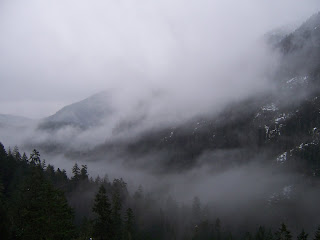Apologies; I have been remiss in my duties as a virtual host in that I have failed to offer you the grand tour of these new Northwestern surroundings. To address this egregious wrong, I invite you now to explore the strange familiarity of the Northwest.
I woke up this morning to an almost-familiar Hoot! Hoot! But the sound that would have been a train whistle in my Midwestern hometown was here the bleat of an ocean-going ship. Overseas, you expect things to be stunningly different: fern-trees and kiwi-birds, Greek-alphabet shop signs and Cyrillic train schedules. On this distant shore of our own country, things are not always as familiar as it seems like they should be.
Take slugs. Instead of manageable brown ones inhabiting the cornstalks of my youth, those here grow into juicy six-inch cigars. Also, the chickadees are too small, the gulls are too big, the jays have shaved their crests, and the ducks sport mohawks. Bald eagles soar over the local Wal-Mart, whose front doors boast a first-rate view of a mountainous horizon. Rhododendron-like plants grow as skinny trees called madronas whose bark peels off in satisfying flakes. In backyards, ragged stands of cedars stretch to the clouds like gangly arbor vitae on prescription-strength Miracle-Gro. (Even these are juniors compared to the "grandfather trees" of the deep backcountry.) Below the trees, moss invades yards more militantly than dandelions. Green-rimmed waterways zigzag in every direction so that the air smells of salt and tidal mudflats instead of the algae and marshland of the Ten Thousand Lakes.

The horizon, at least, bears no Midwestern tinge. Olympic National Park, whose crags peek over the western horizon, contains no rolling hills (and very few roads), report exhausted but glowing hikers. The Cascades stretch like a ragged wall across the landscape in the east, separating the temperate rainforests of Puget Sound from the high desert of Yakima and Spokane. But, on a clear day, even these great peaks look only as tall as rough cement compared to the Mountain. When it shows itself, Rainier appears an order of magnitude more massive than everything surrounding, as if someone had erected a giant magnifying glass on the far side of Tacoma. Strange, though, how such a bulk can camouflage itself so easily: its patchy snow blends with the wispy clouds to hide the mountain as you gaze into the distance, until something clicks in your brain and your eyes suddenly register the presence of something vast.

According to Timothy Eagan's The Good Rain, Seattle gets less precipitation than New York, Boston, Washington, Philadelphia, and Miami (p. 49)—it just rains more often, as mists and light sprinkles. Thunderstorms are rare. A dark horizon doesn't always indicate a menacing front. There are all-day rains, but more often, it sprinkles off and on for several days, and it's hard to predict which will happen when. But even on these overcast days, when haze obscures the mountains, the sky puts on a quiet show. The clouds are infinitely creative performing artists. Of the many kinds of clouds Waukesha sees in a month, all of them at once might gather over the Northwest, each at its own altitude, each in its own costume, as if waiting in the wings for its cue to storm into Milwaukee or pour into New York.

Some things remain familiar. As an indoctrinated practitioner of Minnesota Nice, I appreciate the series of commercials that heroize such Northwest characters as the guy who lets everyone else go first at a four-way stop (to the confusion and delay of all, including a bystanding jogger, in the ad). Kudos also go to the socks-and-sandals guy, the guy who camps under a tarp ("You bring your own blue skies"), and the Walla Walla wine wine woman woman. The sponsoring company claims that they are "A lot like you—a little different."
To this wandering Midwesterner, the Northwest is indeed a little different. And the little differences make all the difference in the world.


